
COP27 - Sara Elvira Kuhmunen - Young People Must Join The Fight!
In this radio program, Cultural Survival speaks to Sara Elvira Kuhmunen from Sapmi. Sara says the youth needs to join hands in fighting climate change, or else we will have no culture and no future.
Produced by Shaldon Ferris (Khoisan)
Interviewee: Sara Elvira Kuhmunen (Sami)
Music: "LIBRES Y VIVAS by MARE ADVETENCIA, used with permission.
"Burn your village to the ground", by The Halluci Nation, used with permission.
COP27 - Special Rapporteur On Climate Change: Offenders Of Indigenous Peoples Must Be Prosecuted
Cultural Survival attended COP 27 In Sharm El Sheikh, Egypt in November 2022.
In this radio program, we interviewed Ian Fry, the Special Rapporteur On Climate Change.
Produced by Dev Kumar Sunuwar (Sunuwar)
Interviewee: Ian Fry
Music: "LIBRES Y VIVAS by MARE ADVETENCIA, used with permission.
"Burn your village to the ground", by The Halluci Nation, used with permission.
COP27 - Rodion Sulyandziga: It Is Time To Evaluate The COP Processes From The Indigenous Perspective
In this radio program, Cultural Survival speaks to Rodion Sulyandziga from Siberia. The discussion is about the evaluation of the COP processes from the perspective of Indigenous Peoples.
Produced by Dev Kumar Sunuwar (Sunuwar)
Interviewee: Rodion Sulyandziga (Udege)
Music: "LIBRES Y VIVAS by MARE ADVETENCIA, used with permission.
"Burn your village to the ground", by The Halluci Nation, used with permission.
COP 27 - Edna Kaptoyo - Now Is The Time To Call For Action!
In this radio program, Cultural Survival speaks to Edna Kaptoyo from Kenya. Edna talks about how important it is to call for action now.
Produced by Shaldon Ferris (Khoisan)
Interviewee: Edna Kaptoyo (Pokot)
Music: "LIBRES Y VIVAS by MARE ADVETENCIA, used with permission.
"Burn your village to the ground", by The Halluci Nation, used with permission.
COP 27 - James Anaya - The COP Process Addresses Climate Change In A Real Way
In this radio program, former Special Rapporteur on the Rights of Indigenous Peoples James Anaya discusses the importance of the UNFCCC Conference of the Parties, as a process to combat climate change.
Produced by Dev Kumar Sunuwar (Sunuwar)
Interviewee: James Anaya (Apache and Purépecha)
Music: "LIBRES Y VIVAS by MARE ADVETENCIA, used with permission.
"Burn your village to the ground", by The Halluci Nation, used with permission.
COP27 - Johnson Cerda On The Glasgow Climate Pact
In this radio program, Johnson Cerda discusses the Glasgow Climate Pact and how some elements of the pact such as adaptation, mitigation, and loss and damage are really important to Indigenous Peoples.
Produced by Shaldon Ferris(Khoisan)
Interviewee: Johnson Cerda (Kichwa)
Music: "LIBRES Y VIVAS by MARE ADVETENCIA, used with permission.
"Burn your village to the ground", by The Halluci Nation, used with permission.
COP 27 - Aeshatou Manu From Cameroon On How Climate Change Affects Indigenous Peoples
In this radio program, Cultural Survival speaks to Aeshoutou Manu from Cameroon, and she details how Climate Change affects the Mbororo Indigenous Peoples.
Produced by Dev Kumar Sunuwar (Sunuwar)
Interviewee: Aeshoutou Manu (Mbororo)
Music: "LIBRES Y VIVAS by MARE ADVETENCIA, used with permission.
"Burn your village to the ground", by The Halluci Nation, used with permission.
COP27 - Pasang Dolma - Sherpa Talks About The History Of COP
In this radio interview, Cultural Survival talks to the former co-chair of the International Indigenous Peoples Forum on Climate Change. They discuss the history of COP.
Produced by Dev Kumar Sunuwar (Sunuwar)
Interviewee: Pasang Dolma-Sherpa (Sherpa)
Music: "LIBRES Y VIVAS by MARE ADVETENCIA, used with permission.
"Burn your village to the ground", by The Halluci Nation, used with permission.
COP27 - Sele Tagivuni: Indigenous Peoples And Local Communities Must Be Respected And Listened To
In this radio program, Cultural Survival's Dev Kumar Sunuwar interviews Sele Tagivuni from Fiji and they discuss how Indigenous Peoples must be heard on matters pertaining to climate change.
Produced by Dev Kumar Sunuwar
Interviewee: Sele Tagivuni
Music: "LIBRES Y VIVAS by MARE ADVETENCIA, used with permission.
"Burn your village to the ground", by The Halluci Nation, used with permission.
COP27 -Jennifer Lasimbang: We Want Governments To Recognize Indigenous Knowledge
In this radio program, Cultural Survival's Dev Kumar Sunuwar interviews Jennifer Lasimbang and she tells us about the importance of Indigenous Knowledge and how it can contribute to the battle against climate change.
Produced by Shaldon Ferris (Khoisan)
Interviewee:Jennifer Lasimbang (Kadazan)
Music: "LIBRES Y VIVAS by MARE ADVETENCIA, used with permission.
"Burn your village to the ground", by The Halluci Nation, used with permission.
